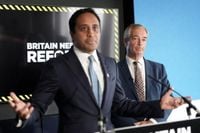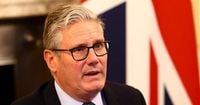Reform UK has ignited a fierce national debate with its newly unveiled five-year plan to detain and deport all migrants who arrive in the UK without permission, a proposal that party leader Nigel Farage claims could see up to 600,000 people removed from the country over a single parliamentary term. Announced on August 26, 2025, Operation Restoring Justice marks the most ambitious—and contentious—immigration policy ever tabled by a major UK political party, with its architects promising a complete overhaul of asylum law, mass detentions, and international deals that critics say stretch the limits of legality and morality.
At the heart of Reform UK's plan is a dramatic ramp-up in deportations, a new legal regime that would override international human rights conventions, and a £2 billion budget to secure returns agreements with countries such as Afghanistan and Eritrea. Farage, speaking at a press conference, described illegal migration as a "scourge" and declared, "The only way we'll stop the boats is by detaining and deporting absolutely anyone who comes via that route. And if we do that, the boats will stop coming in days because there will be no incentive." According to BBC, Farage previously called mass deportations a "political impossibility," but now insists, "We can deport hundreds of thousands of people over the five years of a Reform government."
The proposed Illegal Migration (Mass Deportation) Bill would bar anyone arriving on small boats from claiming asylum, create a legal duty for the home secretary to remove illegal migrants, and impose a lifetime ban on re-entry for those deported. The bill would also "disapply" the 1951 Refugee Convention and the European Convention on Human Rights (ECHR), replacing the Human Rights Act with a British Bill of Rights applicable only to UK citizens and legal residents.
Reform's plan includes the arrest and detention of all arrivals at disused RAF bases, with the party aiming to build removal centres in remote areas capable of detaining up to 24,000 people within 18 months. Charter flights would be scaled up to five per day, and migrants could be sent to third countries such as Rwanda and Albania, or even to British overseas territories like Ascension Island as a fallback for those awaiting deportation. Those who agree to return voluntarily would be offered £2,500 as part of a "carrot and stick approach."
Perhaps the most controversial element is the party's willingness to pay regimes like the Taliban to accept returned migrants. Zia Yusuf, Reform UK's government efficiency chief, told BBC Radio 4, "We have a £2bn budget to offer countries." When pressed on whether this meant paying the Taliban, Yusuf replied, "This country already gives £151m a year to Afghanistan in the form of foreign aid. I think it's quite reasonable." He argued, "British people have had enough of their goodwill being taken advantage of." According to The Independent, Yusuf insisted the plan is realistic, estimating costs at £10 billion over five years but claiming it would save "hundreds of billions of pounds in the decades to come" by reducing strain on the NHS, welfare, and other public services.
Political opponents have lined up to denounce the plan as unworkable, unethical, and potentially illegal. Housing minister Matthew Pennycook dismissed Reform's proposals as "put together on the back of a fag packet," questioning how the party could negotiate returns agreements with regimes like the Taliban. Pennycook pointed to the government's own "one in, one out" pilot scheme with France—under which migrants arriving by small boat could be sent back to France in exchange for the UK accepting an equal number of asylum seekers with family ties—as a more practical approach. "The idea that Nigel Farage and the circus that is Reform can come in and secure those agreements, I think is for the birds," he told Sky News.
The Society of Labour Lawyers, a think tank advising the Labour party, was even more scathing. Its chair, George Peretz KC, told The Guardian, "The Reform party’s policy is simply not rooted in reality. They want to institute a mass deportation programme with no real, or workable, idea of where people would be deported to. Reform’s policy would require a returns policy to be negotiated with regimes such as the Taliban and Iran, and may, by their own admission, involve paying those regimes to do so. Which is impractical and extremely concerning, as well as unlawful (as our own courts ruled in the Rwanda case)."
Conservative leader Kemi Badenoch echoed concerns about the legal and diplomatic implications of leaving the ECHR, noting, "Saying you’re going to leave the ECHR is not a plan. It will have an impact on things like the Good Friday Agreement and needs to be done in a way that does not destabilise the country or economy." She accused Reform UK of copying Conservative proposals without grasping their complexities: "We set out our Deportation Bill months ago. He’s copied our homework but missed the lesson."
Liberal Democrat deputy leader Daisy Cooper condemned the plan for "ripping up" human rights and potentially sending taxpayer money to oppressive regimes. "Farage’s plan crumbles under the most basic scrutiny. The idea that Reform UK is going to magic up some new places to detain people and deport them to, but don’t have a clue where those places would be, is taking the public for fools," she said. On the proposal to pay the Taliban, she added, "Reform’s Taliban tribute plan would send British taxpayers’ cash to fund their oppressive regime, fuelling the persecution of Afghan women and children and betraying our brave armed forces who sacrificed so much fighting the Taliban."
Green Party MP Ellie Chowns warned of the risks to vulnerable people, saying Reform's proposals "rely on ripping up swathes of international law and would likely face many legal obstacles in the UK courts that could use British common law to block such cruelty." She added, "They must know what is likely to happen to these people when they are returned—they will likely be abused, tortured or executed. This is not who we are as a nation."
Despite the backlash, Farage and Yusuf remain adamant that the plan is both necessary and achievable. Yusuf, speaking to BBC Breakfast, insisted, "This not only can be done, it must be done. The social contract in this country is hanging by a thread." Farage acknowledged the difficulties, especially in cases involving children or those with long-standing ties to the UK, but argued, "What really bothers me is what is happening on the streets of our country. What really bothers me is... the growing concern with justifiable evidence that women and girls are far less safe on the streets than they were before this began. So it’s all about whose side are you on?"
The scale of the migration issue is undeniable. According to Home Office data cited by the BBC and The Guardian, 28,288 people have crossed the English Channel in small boats so far in 2025, a 46% increase over the same period in 2024, and a record 111,000 asylum applications were made in the year to June. Since the 2024 general election, more than 52,000 people have arrived by small boat.
The government, led by Labour's Keir Starmer, has made tackling illegal migration a central priority, emphasizing "unglamorous but practical" steps and new agreements with France. But with Reform UK leading in the polls and public anger over the use of hotels and public services at a boiling point, the political pressure to deliver solutions—however controversial—has never been greater.
As the debate rages, one thing is clear: the UK's approach to migration and asylum is at a crossroads, with the choices made in the coming months likely to define the nation's identity, values, and international standing for years to come.


